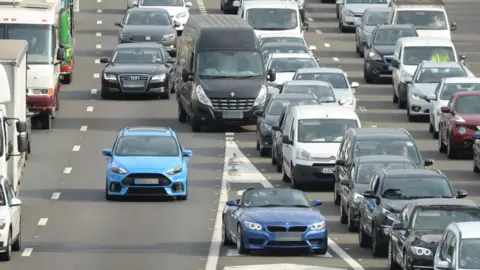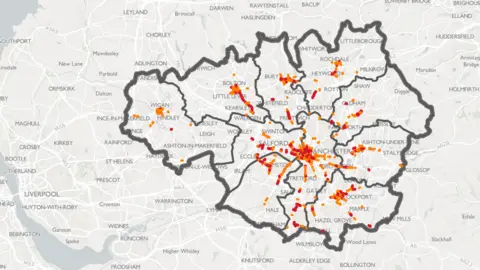Greater Manchester firms 'threatened' by lack of air pollution funding
 Getty Images
Getty ImagesSmall firms could go bust because the government will not give them more time to replace heavily polluting vans, said Greater Manchester Mayor Andy Burnham.
High emission buses, lorries and taxis are due to be penalised from 2021 as the region's combined authority introduces a clean air zone.
It wanted to make vans exempt until 2023 to give small firms longer to switch to cleaner alternatives.
But the government wants the penalties to be introduced two years earlier.
It has offered £36m to pay for enforcement cameras.
Van drivers could be charged £7.50 per day under the plans.
Mr Burnham has called for an urgent meeting with the environment secretary.
"We don't want to see a single job or business threatened by the process of cleaning up our air," said the Labour mayor.
"But we can't guarantee this without help from the government."
The Greater Manchester Combined Authority (GMCA) Clean Air Plan aims to find ways to reduce air pollution caused by traffic.
It had requested £116m of "clean vehicle funding" to help local businesses switch to cleaner vehicles.
But the government said the devolved city region is not eligible for such support.
After a July 2017 study by the Department for Environment, Food and Rural Affairs found excessive nitrogen dioxide levels, the government ordered councils in seven of Greater Manchester's 10 boroughs to implement a clean air plan no later than the end of 2020.
Oldham was added to the original list - Bury, Bolton, Manchester, Salford, Stockport, Tameside and Trafford - in May 2018.

Clean air plans
 Greater Manchester Combined Authority
Greater Manchester Combined Authority- Estimates show polluted air contributes to the equivalent of 1,200 deaths a year in the region, GMCA has said
- About 150 roads across Greater Manchester are exceeding legal limits of harmful nitrogen dioxide (NO2), according to the government
- The plans aim to reduce NO2 emissions
- A £7.50 per daily charge was due to be introduced for vans from 2023
- Includes fines for "high-polluting" vehicles, defined as buses and HGVs built before 2013, diesel cars built before 2015, petrol cars built before 2005, and vans and mini buses built before 2016

